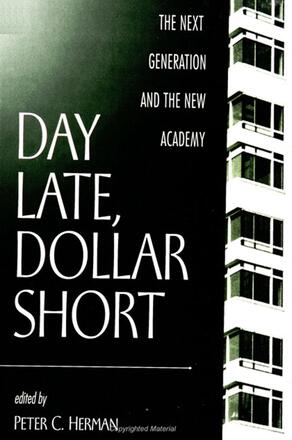
Day Late, Dollar Short
The Next Generation and the New Academy
Explores how shifts in the job market and changes in university culture and administration have influenced the "post-theory" generation of literary critics.
Description
This book explores how recent changes in university culture and administration have affected and will continue to affect the "next generation" of literary critics. How have these recent shifts in material conditions inflected the criticism, sense of the profession, and modes of scholarship of this next generation? If the sixties produced "Theory," then what have the eighties and nineties produced? How has the corporatization of the academy affected hiring practices, and how will it shape the careers of those hired? What will be the impact of computers, the internet, and the various proposed "virtual" universities? In addressing these and other questions, the book marks a profound moment of institutional crisis, and will serve as a resource to all who are concerned with the future direction of literary studies and of higher education in general.
Contributors include Crystal Bartolovich, Michael Berube, Jeffrey R. Di Leo, David Galef, Gerald Graff, Susan Johnston, Neil Larsen, Sharon O'Dair, Barbara Riebling, Jesse Swan, and Jeffrey Williams.
Peter C. Herman is Associate Professor of English at San Diego State University. He is the author and editor of several books, including Squitter-Wits and Muse-Haters: Sidney, Spenser, Milton, and Renaissance Antipoetic Sentiment, and Rethinking the Henrician Era: New Essays on Early Tudor Texts and Contexts.
Reviews
"Day Late, Dollar Short is a fine collection of timely essays by young literary theorists on the contemporary crisis and future challenges in the profession. One of the salient themes so often struck by several writers in this volume is that the ivory tower must reinvent itself and find a more public form. It is this book's most attractive claim that many of its contributors do indeed write in the voice of public intellectuals. " -- Amitava Kumar, editor of Poetics/Politics: Radical Aesthetics for the Classroom
"This book sends a clear and unimpeachable message: the conditions of academic life have changed for the worse in recent years, and there is now a significant cohort of new scholars and teachers attempting to carry out what they can of their work. We need a book like this, one that de-mystifies the demise of the traditional academic career, and that not only offers careful readings of the current scene but, from there, seeks new and realizable goals. " -- Mike Hill, University at Albany, State University of New YorkThis book explores how recent changes in university culture and administration have affected and will continue to affect the "next generation" of literary critics. How have these recent shifts in material conditions inflected the criticism, sense of the profession, and modes of scholarship of this next generation? If the sixties produced "Theory," then what have the eighties and nineties produced? How has the corporatization of the academy affected hiring practices, and how will it shape the careers of those hired? What will be the impact of computers, the internet, and the various proposed "virtual" universities? In addressing these and other questions, the book marks a profound moment of institutional crisis, and will serve as a resource to all who are concerned with the future direction of literary studies and of higher education in general.
Contributors include Crystal Bartolovich, Michael Berube, Jeffrey R. Di Leo, David Galef, Gerald Graff, Susan Johnston, Neil Larsen, Sharon O'Dair, Barbara Riebling, Jesse Swan, and Jeffrey Williams.